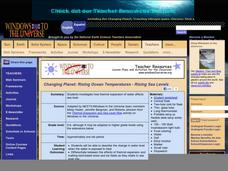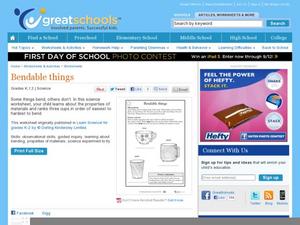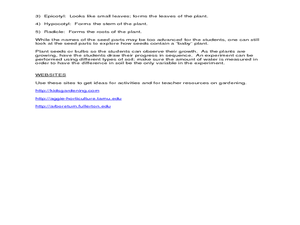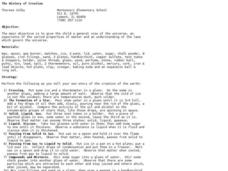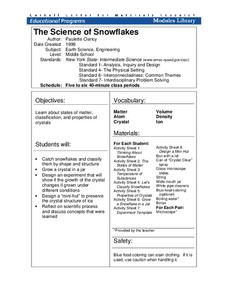Curated OER
Go To The Head of the Cloud
Students pretend they are water droplets traveling through the water cycle. Using their text, they discover the steps in the cycle and the different paths water can take. They write a report about their journey through the water cycle...
Curated OER
Changing Planet: Rising Ocean Temperatures - Rising Sea Levels
As an anticipatory set, young environmental technicians watch a video about how ocean temperatures seem to be changing along with the global climate. They perform a laboratory demonstration with the purpose of observing what happens to...
Messenger Education
Cooling with Sunshades
Messenger's sun shade measures 8 ft x 6 ft and will have temperatures reaching 700 degree Fahrenheit on the outside while maintaining a cool 70 degrees underneath. In the third activity of four, groups discuss the basic properties of...
Curated OER
Ice Cream
Students explore the concept of the colligative property. Through experimentation, students lower the freezing point of a liquid in order to create a solid by using household ingredients to create ice cream.
Curated OER
Icebergs Ahead!
Learners examine icebergs and how they are suspended in water, why ice floats, the melting process of an iceberg, and the floating behavior of ice compared to that of a cork through a lab activity.
Curated OER
Melting Ice
Students observe the melting of ice and explore the basic physical changes that occur. They gain information of how different substances change the rate of melting. Students discuss the properties of water and ice, the definition of...
Curated OER
States of Matter
Learners explore the states of water. In this physical science lesson, students use ice and dry ice to observe the changes in the state of matter. Learners record the results.
Curated OER
Bendable Things
What kinds of cups can bend? Kindergartners find out with a straightforward science inquiry, designed to teach them about the properties of materials. They hypothesize about the flexibility of a china cup, a plastic cup, and a paper cup....
Curated OER
Cool and Not-So-Cool Materials
Why do some materials feel cool to the touch, but not others? Learn about thermal conductors and thermal insulators with a fun science experiment. First, kids read the results of an experiment with spoons and hot water. They then try...
American Chemical Society
From Gas to Liquid to Solid
From gas to liquid condensation to solid frost, water undergoes phase changes before students' eyes! Using ice, salt, water, and a metal can, they set up an investigation that can be used in a physical science setting, or as part of a...
Curated OER
Solid Water
Students turn solid water (ice) into liquid water. In this solid and liquid water lesson plan, students use water, ice, cups, and heat in order to change water from one state to another. They draw their findings as well.
Curated OER
Melt the Ice
Young scholars examine and discuss how water changes from a liquid to a solid to a gas. They explore this concept by having an ice cube race, competing to see which group can change the solid water back into liquid water first.
Curated OER
Ice Balloons
Students explore the properties of ice. In this states of water lesson, students examine the properties of icebergs and ice cubes as they participate in an activity that requires them to freeze a balloon half-filled with water and freeze...
Discovery Science Center
Kindergarten Observing, Comparing and Contrasting
Although this is a science lesson, it can be adapted to help meet Common Core standards in math as well. Starting scientists describe physical properties of objects and explore three forms of water. To address the Common Core, they can...
Curated OER
Amazing Salt
Students examine the effects of salt on ice. In this salt lesson, students observe what happens to the temperature of ice when salt is added, then make ice cream to see how this knowledge can be used.
Curated OER
The History of Creation
Students explore the properties of matter. In this lesson about matter, students will do a series of experiments to enable them to understand about creation of the universe. In these some of the experiments students will makes stars,...
Curated OER
Local Hydrologic Cycle
Students draw the water cycle as it occurs in their community. In this water cycle lesson, students observe demonstrations of sublimation and infiltration. They also use photographs or their own drawings of their environment to label...
Curated OER
The Open Ocean, What is it and How Does it Change?
Students investigate the ocean environment. In this ocean lesson, students discover the physical properties of the ocean. Over two days, students work in small groups investigating ocean maps and creating water currents.
Curated OER
One World Ocean
Students compare and contrast the properties of salt water in the oceans/seas and freshwater elsewhere on the planet. They also analyze mixing caused by currents in the ocean, including the effects of warm and cold water as well as with...
Curated OER
Change It
Fourth graders expand their knowledge about how the physical properties of a substances can be changed. They are given multiple opportunities, using first-hand experiences and familiar objects in different contexts, to identify...
NOAA
Please Pass the Salt
Salinity is the focus of two experimenters that work to answer the question, How does salt change the physical properties of water? Super scientists compare the freezing rate of salt and fresh water, combine the two waters to observe how...
University of Chicago
Don't Be Too Flaky
Snow, ice, and water are all composed of H2O. Does that mean they all have the same volume? Discover the ways that the densities of these substances determine their volumes, and how they change based on their current states of matter....
Cornell University
The Science of Snowflakes
Who can grow the best crystals? Challenge class members to develop strategies for enhancing growth in the crystals. Through a lab investigation, learners study the properties of crystals and test the effectiveness of different growth...
Center for Learning in Action
Introduction to the States of Matter
Liquids, gases, and solids are the states of matter in which scholars investigate in a lesson plan that offers in-depth information and engaging activities that look into the three states and the changes their properties make when mixed...



